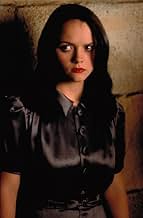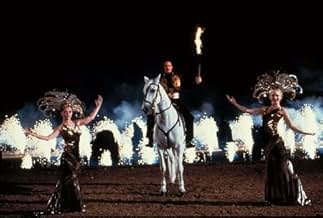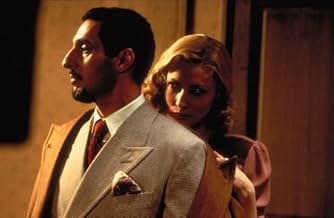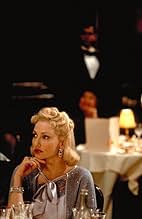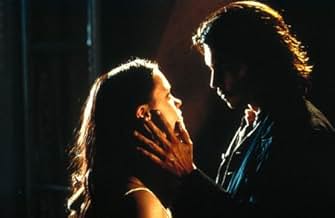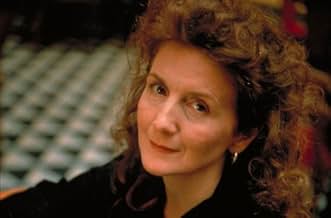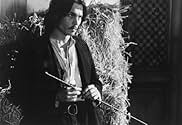AVALIAÇÃO DA IMDb
6,1/10
17 mil
SUA AVALIAÇÃO
Uma jovem refugiada viaja da Rússia para os Estados Unidos em busca de seu perdido pai, e se apaixona por um cavaleiro cigano.Uma jovem refugiada viaja da Rússia para os Estados Unidos em busca de seu perdido pai, e se apaixona por um cavaleiro cigano.Uma jovem refugiada viaja da Rússia para os Estados Unidos em busca de seu perdido pai, e se apaixona por um cavaleiro cigano.
- Direção
- Roteiristas
- Artistas
- Prêmios
- 3 vitórias e 3 indicações no total
- Direção
- Roteiristas
- Elenco e equipe completos
- Produção, bilheteria e muito mais no IMDbPro
Avaliações em destaque
I was in San Francisco and decided to see an "artsy" film. I bought tickets to this movie and was quite impressed, even though I am usually a fan of movies like The Terminator and Armageddon. The movie takes place around 1927 with a young girl named Feglee playing with her dad in the field. He soon gets drafted and soon sends for his daughter. She ends up getting put onto the wrong boat and ends up in Paris where she is re-named Suzie. The young girl soon morphs beautifully into Christina Ricci who makes friends with the smart and sexy Lola (Cate Blanchett). They get jobs as Opera singers and the both of them find love. Lola, with the main Opera Singer named Dante, and Suzie with a gypsy named Cesar, who takes care of the horses. Dante finds out that Suzie is Jewish and ends up telling people, which would put her in danger. So Suzie must decide whether she should flee and go to America to find her father or stay with Cesar. I was truly surprised that I could enjoy a movie like this. Of course this movie has some slow parts, but which movie doesn't? And the performances were truly outstanding. An unrecognizable Cate Blanchett and Johnny Depp seriously were in their characters. But the movie belongs to Christina Ricci. I have seen her play a rebel-type explosives expert, a seductive pregnant 16 year old, a mischievous young teen, a b*tchy lawyer, a perky sorority sister, a freaked out laundry mat owner, Wednesday Addams etc. And now here she is taking on another challenging role as a quiet English accent- opera singer. This movie is really good, and the ONLY other romantic movie I enjoyed was Titanic. (***1/2 out of ****)
First of all, try to avoid the trailer before watching the movie if you can. The Man Who Cried is about a young Jewish girl living in Russia in the late twenties who has to flee her home country and eventually ends up in Paris as a young adult just before the onset of World War II. She gets involved with a cabaret showgirl played by Cate Blanchett, an Italian opera singer played by John Turturro and a gypsy man played by Johnny Depp. I found the movie slow-moving but not boring. It had a certain melancholy to it where almost everything was restrained and understated. There are dramatic moments but no big melodrama which honestly I kinda missed. I wasn't particularly touched nor did I cry or even get teary-eyed. Your own mileage might vary, but I don't think it's a big tear-jerker.
There's a lot of music (mostly opera but not usually the bombastic cliché kind) in this film with two important recurring songs. They're quite beautiful especially the french song "Je crois entendre encore" which weirdly I didn't recognize as French despite it being my native language. The songs are important because they often convey the emotions felt instead of words. It doesn't really matter that you don't understand the words. As an historical drama, it mostly skirts big events, mostly focusing on their effects on our characters from different nationalities. You need some minimal historical background to get what is happening. The whole first part with the exile of the little girl was pretty gripping. She seemed so small and vulnerable. The romantic aspect was two-fold. The relationship between Cate Blanchett and John Turturro's characters was very interesting but not romantic. The relationship between Christina Ricci and Johnny Depp's characters was less interesting but more romantic.
Johnny Depp doesn't say much but his presence is felt. He was born to play sexy gypsy men and I suspect most women will "swoon" over him ;) The other performances were fine with the stand-out being Cate Blanchett as a somewhat superficial Russian dancer trying to marry into richness. The songs were mostly lip-synched. I think they were done very well but still it disturbed somewhat my suspension of disbelief. In conclusion, I liked watching it, it was well made with strong actors but the story could have been told a little better to engage the viewer more emotionally. It didn't strike me as particularly memorable or as the highlight of any of these actor's resumes.
Rating: 6.5 out of 10 (good)
There's a lot of music (mostly opera but not usually the bombastic cliché kind) in this film with two important recurring songs. They're quite beautiful especially the french song "Je crois entendre encore" which weirdly I didn't recognize as French despite it being my native language. The songs are important because they often convey the emotions felt instead of words. It doesn't really matter that you don't understand the words. As an historical drama, it mostly skirts big events, mostly focusing on their effects on our characters from different nationalities. You need some minimal historical background to get what is happening. The whole first part with the exile of the little girl was pretty gripping. She seemed so small and vulnerable. The romantic aspect was two-fold. The relationship between Cate Blanchett and John Turturro's characters was very interesting but not romantic. The relationship between Christina Ricci and Johnny Depp's characters was less interesting but more romantic.
Johnny Depp doesn't say much but his presence is felt. He was born to play sexy gypsy men and I suspect most women will "swoon" over him ;) The other performances were fine with the stand-out being Cate Blanchett as a somewhat superficial Russian dancer trying to marry into richness. The songs were mostly lip-synched. I think they were done very well but still it disturbed somewhat my suspension of disbelief. In conclusion, I liked watching it, it was well made with strong actors but the story could have been told a little better to engage the viewer more emotionally. It didn't strike me as particularly memorable or as the highlight of any of these actor's resumes.
Rating: 6.5 out of 10 (good)
Although I agree with those who say that Sally Potter's THE MAN WHO CRIED doesn't entirely live up to her two previous works, I think that even so it is still a very good movie.
Apparently things are slowly starting to get better for THE MAN WHO CRIED. At least it has now been played in several countries in Europe other than Italy (like England, Germany and France) and its score and screenplay are finally being sold by Amazon.co.uk. (I'm hoping the VHS and DVD will soon be available also.) I want to contribute to this movie's current rebirth by saying what I think makes it special and definitely worth seeing.
The first thing that comes to my mind about THE MAN WHO CRIED is its formal visual beauty. It is extremely well directed and there are many scenes that I regard to be among the most beautiful ever filmed. Ms. Potter's talent as a film director is undeniable: her style is a mixture of choreographic elegance and subtle sensuality. I have never seen the camera move like it does in her pictures. In ORLANDO and in THE MAN WHO CRIED alike, it has a way of chasing the characters on scene, of playing with them, of circling around them, that makes it seem like an animated being rather than a mechanical object. It literally seems as if the camera dances with the characters it portrays! None of the movies by other directors I've seen so far are 'written' in this same 'language.' Ms. Potter's personal contribution to the renewal of the existing 'cinematographic grammar' shouldn't be underestimated.
A second striking quality of THE MAN WHO CRIED is the music in it. The director said that 'The intention was to find a way of telling the story where music was carrying emotional and spiritual truth with as much force as the images and the characters.' By frequently reiterating a set of intensely powerful, culturally eloquent and evocative pieces among others, Purcell's Dido's Lament, Bizet's Je Crois Entendre Encore and instrumental pieces by Goliov which serve to remind the characters who they are and where they come from (besides giving the movie cohesion), she succeeds in this difficult task brilliantly. (And courageously: not many film directors, I believe, would dare to make a movie with four opera pieces constantly being sung!) The idea that comes through is that when people are left without their cultural identity and/or dignity, music can save them for forgetting their 'Selves,' save them from silence and incommunicability.
As far as the characters in THE MAN WHO CRIED are concerned, I think they are very well thought out and effectively depicted. It is especially admirable that the director would decide to give life to a 'mute heroine,' Suzie-Fegele, who says almost nothing throughout the whole movie, but expresses herself surprisingly well in spite of this. She conveys, with incredible force, that sense of inadequateness and discomfort so many are left with for life when they are put into a hostile environment during their childhood. Cristina Ricci seems embarrassed at times, and rightly so, for in this movie she plays the part of an outcast, and that's the way an outcast often feels, unfortunately. But there's also strength in her eyes, and determination, and, once again, rightly so, for despite all that fate has unjustly taken away from her, she has learned to go on, to look straight ahead and not ever give in, to live and not to let herself die. Cate Blanchett is an exceptional actress and she performs wonderfully in this movie: both her beauty and intelligent eyes were never this intense and captivating. Johnny Depp is, as always, very talented and very handsome.
As I said at the beginning of my review, this movie isn't quite as good as ORLANDO and THE TANGO LESSON (which were, in my opinion, two absolute masterpieces). While those two movies were perfect from the very beginning to the very end, THE MAN WHO CRIED is perhaps a little uneven, in that along with many breathtaking and superb scenes there are a few instances in which something seems to be missing (overall I rate it 9/10). Also, I personally would have preferred for it to be as multilingual as it was multicultural (then again, I know this probably would have made the movie even less popular). Nonetheless I think THE MAN WHO CRIED has all the qualities of a good art product and I feel perhaps some haven't fully appreciated it because they weren't looking at it as one should look at 'poetry,' but rather as one normally looks at 'prose.' There's so much entailed in it, that needs to be interpreted, as with poetry. Sally Potter doesn't flaunt feelings, but they are there, and I guarantee they can stir you immensely if only you cooperate. Every minute of THE MAN WHO CRIED (which I have seen three times already) gave me something special to think about and remember, and movies don't do that to me very often. Consequently I think it would be a real pity for the public not to support this movie and its director. I think Sally Potter is one of the very best film makers around and I hope our support and enthusiasm will persuade her to do even better next time!
Apparently things are slowly starting to get better for THE MAN WHO CRIED. At least it has now been played in several countries in Europe other than Italy (like England, Germany and France) and its score and screenplay are finally being sold by Amazon.co.uk. (I'm hoping the VHS and DVD will soon be available also.) I want to contribute to this movie's current rebirth by saying what I think makes it special and definitely worth seeing.
The first thing that comes to my mind about THE MAN WHO CRIED is its formal visual beauty. It is extremely well directed and there are many scenes that I regard to be among the most beautiful ever filmed. Ms. Potter's talent as a film director is undeniable: her style is a mixture of choreographic elegance and subtle sensuality. I have never seen the camera move like it does in her pictures. In ORLANDO and in THE MAN WHO CRIED alike, it has a way of chasing the characters on scene, of playing with them, of circling around them, that makes it seem like an animated being rather than a mechanical object. It literally seems as if the camera dances with the characters it portrays! None of the movies by other directors I've seen so far are 'written' in this same 'language.' Ms. Potter's personal contribution to the renewal of the existing 'cinematographic grammar' shouldn't be underestimated.
A second striking quality of THE MAN WHO CRIED is the music in it. The director said that 'The intention was to find a way of telling the story where music was carrying emotional and spiritual truth with as much force as the images and the characters.' By frequently reiterating a set of intensely powerful, culturally eloquent and evocative pieces among others, Purcell's Dido's Lament, Bizet's Je Crois Entendre Encore and instrumental pieces by Goliov which serve to remind the characters who they are and where they come from (besides giving the movie cohesion), she succeeds in this difficult task brilliantly. (And courageously: not many film directors, I believe, would dare to make a movie with four opera pieces constantly being sung!) The idea that comes through is that when people are left without their cultural identity and/or dignity, music can save them for forgetting their 'Selves,' save them from silence and incommunicability.
As far as the characters in THE MAN WHO CRIED are concerned, I think they are very well thought out and effectively depicted. It is especially admirable that the director would decide to give life to a 'mute heroine,' Suzie-Fegele, who says almost nothing throughout the whole movie, but expresses herself surprisingly well in spite of this. She conveys, with incredible force, that sense of inadequateness and discomfort so many are left with for life when they are put into a hostile environment during their childhood. Cristina Ricci seems embarrassed at times, and rightly so, for in this movie she plays the part of an outcast, and that's the way an outcast often feels, unfortunately. But there's also strength in her eyes, and determination, and, once again, rightly so, for despite all that fate has unjustly taken away from her, she has learned to go on, to look straight ahead and not ever give in, to live and not to let herself die. Cate Blanchett is an exceptional actress and she performs wonderfully in this movie: both her beauty and intelligent eyes were never this intense and captivating. Johnny Depp is, as always, very talented and very handsome.
As I said at the beginning of my review, this movie isn't quite as good as ORLANDO and THE TANGO LESSON (which were, in my opinion, two absolute masterpieces). While those two movies were perfect from the very beginning to the very end, THE MAN WHO CRIED is perhaps a little uneven, in that along with many breathtaking and superb scenes there are a few instances in which something seems to be missing (overall I rate it 9/10). Also, I personally would have preferred for it to be as multilingual as it was multicultural (then again, I know this probably would have made the movie even less popular). Nonetheless I think THE MAN WHO CRIED has all the qualities of a good art product and I feel perhaps some haven't fully appreciated it because they weren't looking at it as one should look at 'poetry,' but rather as one normally looks at 'prose.' There's so much entailed in it, that needs to be interpreted, as with poetry. Sally Potter doesn't flaunt feelings, but they are there, and I guarantee they can stir you immensely if only you cooperate. Every minute of THE MAN WHO CRIED (which I have seen three times already) gave me something special to think about and remember, and movies don't do that to me very often. Consequently I think it would be a real pity for the public not to support this movie and its director. I think Sally Potter is one of the very best film makers around and I hope our support and enthusiasm will persuade her to do even better next time!
The only reason I did not rate this film a "10" was that the Christina Ricci character (Feygele/Suzie), who is supposed to be a superb singer in the era before microphones, was not dubbed by someone who can actually sing. (Ricci, gifted actress that she is, can't, and to a musician, that's a problem). Other than that, I loved this movie. Ricci and Depp, as impossible lovers who just happen to be members of the two peoples most persecuted by the Nazis (a Jew and a Gypsy), are both perfection in their roles. John Tuturro and Cate Blanchett, as (respectively) an Alpha-male Italian tenor enamored of Mussolini, and Suzie's fellow dancer/confidante seduced by the tenor and his Fascist tendencies, are such compelling characters that they almost needed their own separate movie. The cinematography is beautiful throughout, and the sense of history, of the sweep of time, is wonderfully evoked. Last but not least, the score of the film memorably weaves together an old Yiddish lullaby with "Je crois entendre encore," the great tenor aria from Bizet's "Pearl Fishers." Both melodies share the same rhythmic and harmonic skeleton, and the film score reveals and celebrates it. A wonderful musical reflection on the theme of the film in general. Wait until the end of the movie to see what I mean -- the music explains it all.
The film, though highly predictable, is not anywhere near as bad as people make it out to be. It's not boring unless your attention span is that of the typical Hollywood absorbed moron. The acting isn't anything worse than the typical product of that filmworld - though it is slightly better. The story, also, is not a completely typical waste. Now that I've mentioned all of these things about the typical, that is unfortunately exactly what this film is: extremely typical beyond comprehension. Everything, down to the lame, supposedly romantic, slow motion scene of Johnny Depp riding his horse, has been done 3049090348 hundred thousand times before. Most of the story makes a remote amount of sense, except that the Russian soldiers who force Ricci's family to leave Russia for some reason that I must have missed are peaking Polish. Well, in the end, since the composition is pretty interesting, and the music is great, it is worth seeing - unless you have no idea about these things and would rather watch Bruce Willis blow things up.
Você sabia?
- CuriosidadesChristina Ricci and Johnny Depp found it strange and amusing to do sex scenes with each other because they first met when she was 9 and he was 26, when he visited the set of her debut film Minha Mãe é uma Sereia (1990) to see his then-girlfriend Winona Ryder. She said during an interview with ABC News, "I've known Johnny so long, he's protective of me as an older brother and it's weird to think of having sex with him. So we know enough about each other to laugh at it. He said it was 'like we were rooting around together like pigs.' Anyway, I don't think you ever really deal with sexuality on-screen. There are, like, 50 people watching you, and you're just, like, 'Uh, I hope my ass looks good.' There's no deep feeling there. It's just embarrassing."
- Erros de gravaçãoIn the scene where Suzie is following Cesare and his friends on her bike, they go through a passage where you can see the Eiffel Tower in the background and it is lit up. However, the lights were not added to the Tower until 1986.
- Trilhas sonorasJe crois entendre encore (Yiddish Version)
from "The Pearl Fishers"
by Georges Bizet
Performed by Salvatore Licitra and Orchestra of the Royal Opera House
Concertmaster Vasko Vassilev
Principais escolhas
Faça login para avaliar e ver a lista de recomendações personalizadas
- How long is The Man Who Cried?Fornecido pela Alexa
Detalhes
- Data de lançamento
- Países de origem
- Central de atendimento oficial
- Idiomas
- Também conhecido como
- The Man Who Cried
- Locações de filme
- Paris, França(on location)
- Empresas de produção
- Consulte mais créditos da empresa na IMDbPro
Bilheteria
- Faturamento bruto nos EUA e Canadá
- US$ 747.092
- Fim de semana de estreia nos EUA e Canadá
- US$ 93.455
- 27 de mai. de 2001
- Faturamento bruto mundial
- US$ 1.322.763
- Tempo de duração1 hora 40 minutos
- Cor
- Mixagem de som
- Proporção
- 1.85 : 1
Contribua para esta página
Sugerir uma alteração ou adicionar conteúdo ausente


